Turks and Caicos Weather
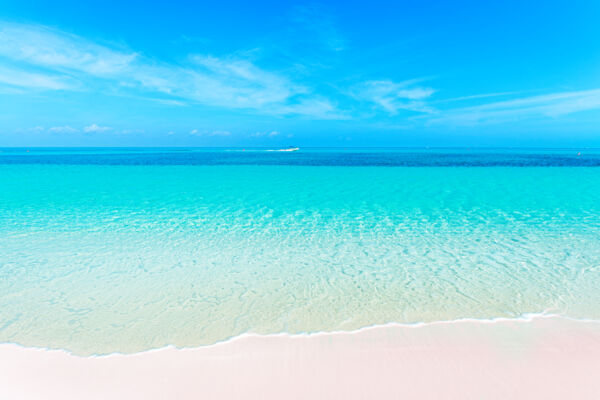
The archipelago nation of Turks and Caicos typically experiences excellent vacation weather, with sunny days, very little rain, and a refreshing trade wind breeze.
Heavy rain showers, winds, thunderstorms, and full cloud cover in the islands are the exception rather than the norm, and are typically associated with passing fronts and regional disturbances.
During normal conditions, Turks and Caicos weather forecasts may show a little rain, yet such showers are often quite brief, localized, and usually won’t impact vacations, as the sun often returns within minutes. Many guests worry about the forecast, but probably shouldn’t.
About 8–10 times per year, extended periods of rain and heavy cloud cover may occur for a few days. Such weather can dampen a visit to the country, yet it’s important to differentiate these fronts from normal conditions when reading forecasts and planning your vacation.
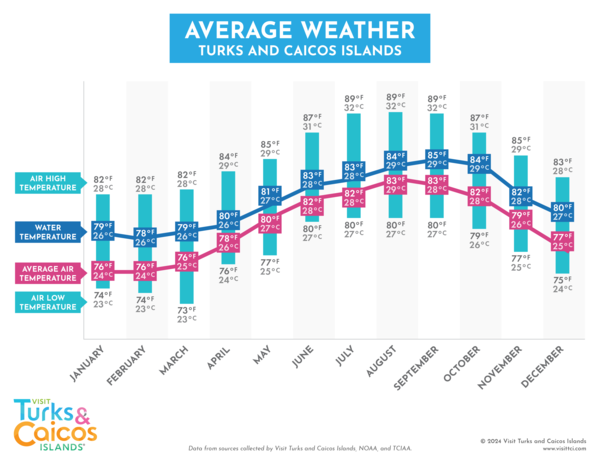
Average Temperature
The average temperature in Turks and Caicos is 80° F (27° C). The average range is 76° to 83° F (24° to 28° C).
Ocean Water Temperature
The average surface water temperature of the surrounding ocean fluctuates less than the air temperature. The water temperature in Turks and Caicos ranges from a low of 78° F (26° C) in the winter to a warm high of 85° F (29° C) in the summer. The seawater temperature of areas and beaches with shallow water, such as Sapodilla Bay and Taylor Bay, can be several degrees warmer than coasts that are either exposed to deep water or have natural tidal movement, such as Grace Bay and Malcolm’s Road Beach.
Those venturing farther from shore, such as scuba divers and snorkelers on a boat cruise, are more likely to experience cooler ocean water.
The “Hot” and “Cool” Seasons
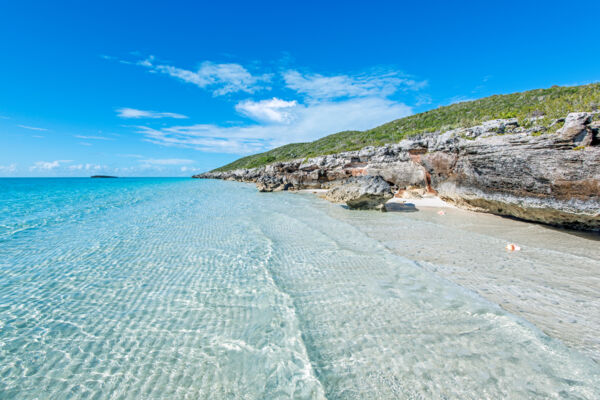
The Turks and Caicos Islands generally experiences pleasant and consistent weather throughout the year.
Compared to northern countries such as the United States, Canada, and the United Kingdom, there’s far less of a distinction in seasons here.
May to October are considered the “hot” months, while November to April are the “cool” months. Although the average monthly variation between the “hot” and “cool” months is only about 10° F (5° C), this difference is definitely noticeable. Depending on your personal preferences, you may find that activities such as cycling, hiking, and exploring historical sites may be a bit too exhausting during the height of summer.
The winter “cool season” months tend to see a greater number of tourist arrivals.
Excepting the occasional passing of a tropical storm or other severe weather event, the weather and conditions for activities on and in the water are typically excellent throughout the year.
Climate Across the Turks and Caicos
When planning your vacation (and for peace of mind), it’s important to understand how the Turks and Caicos weather forecast relates to actual conditions on the islands.
The Turks and Caicos is a relatively small country, and the distance between the western-most (West Caicos) and the eastern-most (Martin Pinzon Cay) land masses is less than 100 miles (160 km), so the weather conditions are generally similar across the archipelago on any given day.
The greatest difference in localized conditions is the later afternoon cloud cover and light rainfall that sometimes occurs over North Caicos, parts of Providenciales, and on Parrot Cay and Pine Cay. These conditions are created by the extensive marine wetlands found on the southern coasts of the central Caicos Islands. As the morning and midday sun heats the saline tundra, the surrounding hot air rises and condenses moisture in the atmosphere into rain.
Rainfall
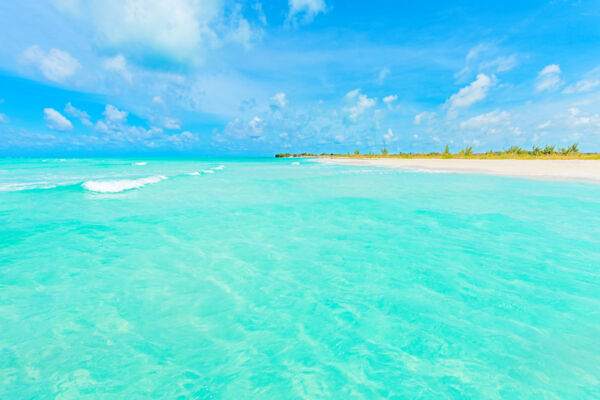
The average annual precipitation in the Turks and Caicos is 33 inches (84 cm). This is one of the lowest rainfall averages in the Caribbean.
There is generally little rainfall in Turks and Caicos throughout the year, and even a drizzle is unlikely during the average visit. It’s commonly said that there are 350 days of sunshine throughout the year, and that’s a surprisingly accurate statement. April to July tends to have the greatest number of showers, but the majority of water comes down at a few individual times during the June to November hurricane season.
This localized rainfall tends to be brief, with showers of under 10 minutes being the norm.
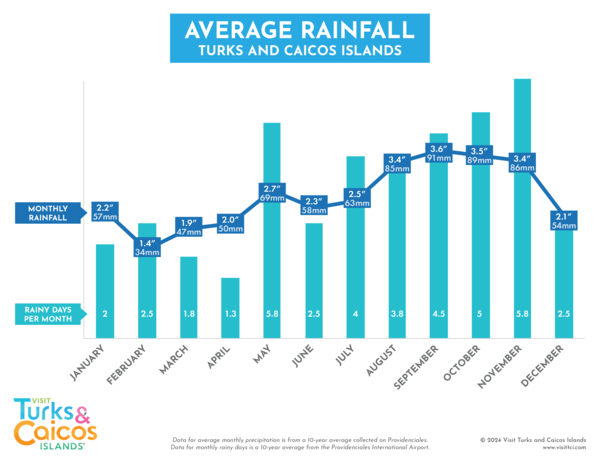
Hourly weather forecasts in the Turks and Caicos Islands base their conclusions off the same data as daily weather forecasts, and don’t have much value. More than two to five days out, the weather forecast is unreliable. Accuracy improves greatly within two to five days of a given date.
Some weather forecast and news websites display a percentage for precipitation or rainfall. This is based on the chance of any rainfall for the given period of time. More often than not, low percentage numbers are experienced as barely noticeable rainfall. Likewise, an icon of rainy clouds is based on the same metric. Rain is typically very localized (a passing rain cloud that only affects a relatively small area of the island).
A more accurate way to predict the likelihood of rain is to look at the satellite imagery for large clouds or incoming weather systems. Within a 48-hour window, the satellite data can be excellent for predicting weather.
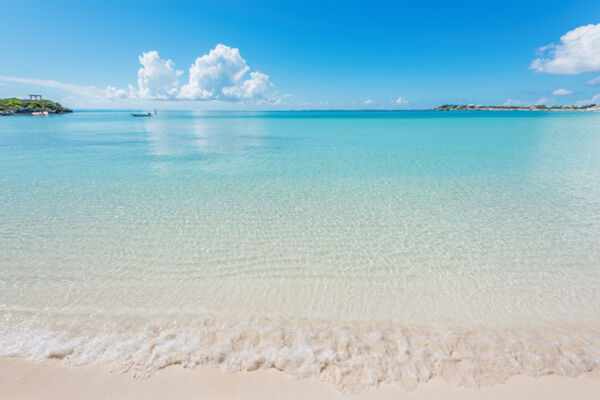
The different islands see a slight variance in rainfall patterns. North Caicos, Middle Caicos, Parrot Cay, and Pine Cay experience the most rain. Providenciales, South Caicos, and East Caicos follow next. Due to their isolated location upwind on the far eastern side of the Turks and Caicos subterranean plateau, Grand Turk and Salt Cay see the least rain.
Occasionally, (an estimated once or twice per month), the country experiences heavy rainfall that may last for a few hours. However, the majority of the annual rainfall in Turks and Caicos is brought by one or two passing tropical cyclones during the summer Atlantic hurricane season.
Unless the forecast shows heavy rainfall throughout the entire day, our advice is to not worry and enjoy your vacation.
Hurricane Season (June 1 to November 30)
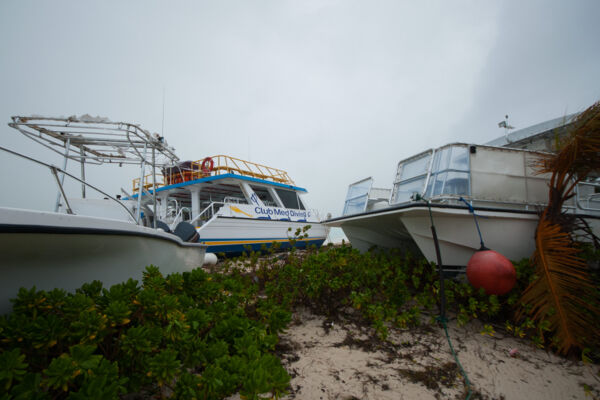
The Caribbean hurricane season is officially from June 1 to November 30. However, the majority of hurricanes that have hit the Turks and Caicos have occurred between the end of August and mid-September. Hurricane Irma hit on September 7, 2017; Hurricane Ike on September 6, 2008; Hurricane Hanna on September 1, 2008; Hurricane Donna on September 7, 1960; and Hurricane Frances on September 1, 2004. Hurricane Kate (November 18, 1985) was a major exception.
While it's rare for a serious hurricane to hit the Turks and Caicos Islands, it is much more common for flights to be rescheduled due to the threat of one.
To avoid your holiday being ruined by a hurricane (or more likely, the chance of one), you may want to avoid visiting between August 31 and September 15.
Flooding and Heavy Rains
Floods and heavy rains occur almost exclusively during the Turks and Caicos hurricane season. The territory typically sees one to two of these torrential downpours annually, and some flooding of roads can be expected. The flood water usually subsides within a few days.
Sun and Cloudy Days
The sun in Turks and Caicos is extremely intense, and it’s common for days to have a UV Index of 12. This means that a sunburn is likely with just 15 minutes of unprotected exposure.
Cloudy and partly cloudy skies can be a bit misleading, as the majority of UV rays can still shine through an overcast sky and cause sunburn.
If you plan to spend your vacation at the beach, take precautions to avoid sunburn. The cooling effect of the water and breeze will likely delay the effects of overexposure to the sun, resulting in painful sunburns which become evident a few hours later.
Weather Stations
The primary weather station for the Turks and Caicos Islands is located at the Providenciales International Airport (PLS), and provides meteorological data used by the National Oceanic and Atmospheric Administration (NOAA). Other individual hotel properties, such as H2O Life. Style. Resort., provide their own weather stations, typically for monitoring conditions for kiteboarding.
What to Do if the Weather’s Bad
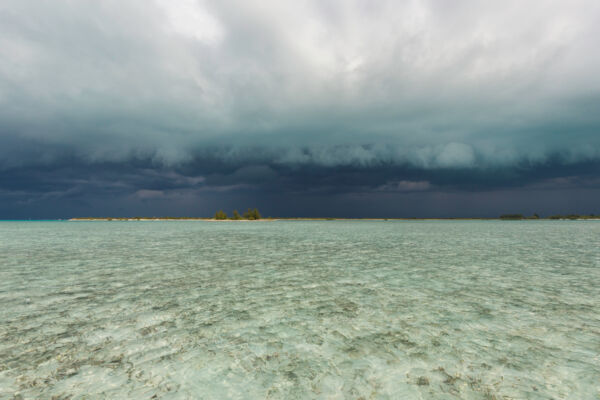
If you’re in the Turks and Caicos and the weather simply isn’t agreeing, consider taking a day trip to one of the outer islands where conditions may be better or visit one of the historical sights or natural attractions.
Unless a serious storm is blowing, it’s typically possible to find a beach that’s sheltered. Generally, the coast on the opposite side of the island (the leeward side) from where the wind is coming from will have the smoothest conditions.
For example, if the north coast beaches of Grace Bay Beach, Leeward Beach, and the Bight Beach are rough, the south coasts of Long Bay Beach, Sapodilla Bay, and Taylor Bay will often be calm.
Mosquitoes
The Turks and Caicos can have mosquito problems at certain times and in certain areas. Heavy rains (typically once or twice per year) are the primary determining factor of mosquito density.
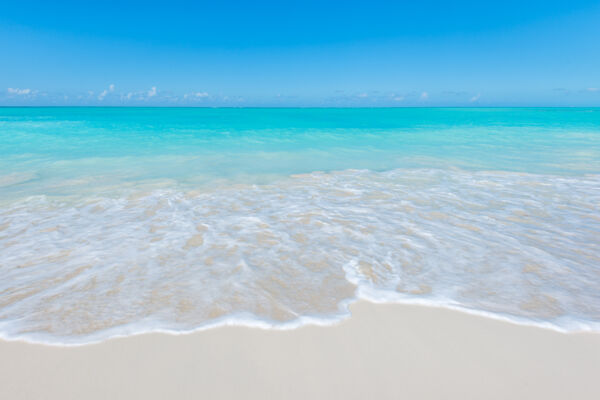
The islands in the Turks and Caicos are affected to different degrees.
For most of the year, Providenciales does not have a mosquito problem. After one of the heavy rains, mosquitoes can be a nuisance for about three weeks.
North Caicos, Middle Caicos, Parrot Cay, and Pine Cay tend to have the most serious insect problems. After heavy rain, mosquitoes and sand fleas can persist for weeks due to the larger number of natural freshwater ponds and caves.
Grand Turk, South Caicos, and Salt Cay have the least issues with the pests, but can still experience them a bit after rains.
If mosquitoes are bad, wearing long sleeves and using insect repellent will help but may not be completely effective. Areas exposed to the wind, typically the eastern coasts, tend to usually be free of mosquitoes. At night, staying in an air-conditioned room can greatly reduce the chance of bites.
Fortunately, the mosquito-borne disease of malaria is not endemic to the Turks and Caicos Islands.









